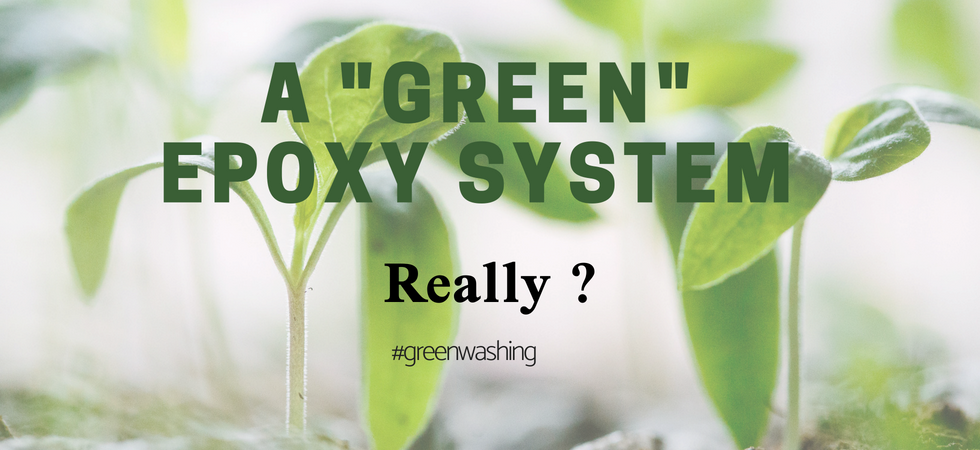Like in all other fields, “green” promises are also on the rise in the resin industry. But does it make sense to announce that a resin is environmentally friendly ? How can we explain that some manufacturers are making that claim ? What do we have to take into account to find out if a resin is truly safe for your health and the environment ?
Is epoxy resin harmful to your health ?
There are many concerns floating around about epoxy. They often arise because it gets confused with polyester resins, which are made with styrene. Polyester resins are indeed quite malodorous and can release harmful gases.
In contrast, epoxy resins should not cause any undue concerns. The main known health problem is allergies caused by contact with the skin: dermatitis. As with all allergies, they can be more or less severe, more or less sudden. Some people develop a reaction after a few years with no former problems.
It’s always more prudent to handle resin with gloves, goggles, and protective clothing in order to prevent risks of contact and splashing.
Epoxy (both resin and hardener) does not generally cause major health problems. It is still, however, a chemical. As such it requires taking precautions. We also recommend keeping it out of reach of children (like most household cleaners).
But is it more risky for the environment ?
Is epoxy resin harmful to the environment ?
As a general rule, epoxy, polyurethane, or silicone, are completely inert once catalysed and thus environmentally safe.
Therefore, when your epoxy resin is completely polymerized, it cannot contaminate the environment.
This is especially true if:
1- The preparation and mix are perfect. It is therefore crucial to follow the ratio and to mix the resin and hardener adequately to ensure complete polymerization, which means the molecular chain is completely closed. (When all the molecules within the liquid version of parts A and B are assembled once the product is mixed and has solidified)
2- Choosing a resin formulated with 100% solids. This means that the system contains no water or solvent. With epoxy systems free from Volatile Organic Compounds (VOC), you ensure that once the resin/hardener mix has polymerized, there will be no solvent emanation.
What’s behind the promise of a “green” resin ?
However, the question regarding the pertinence of green resin arises from some products having appeared on the market showcasing the fact that they are formulated using organic ingredients, such as legumes or other plant-based ingredients.
Such an argument should draw the attention of an informed consumer, who should then ask themselves the following questions:
1- What quantity of additives is present in the formula?
2- Is a product automatically “green” because a few plant-based substances are added to the formula (in perhaps infinitesimal doses ?!) ) ? Is the rest of the formula composed of raw materials that are commonly found in epoxy ?
3- How do those ingredients improve the formula and therefore your results when you use that product ?
For now, these questions do not seem to have answers. Worse, this raises even more question about the manufacturer’s need to insist on the innovative nature of this type of formulation in the field of thermosetting resins without any proof or scientific explanation.
In addition, let us push this reasoning even further. What is the legitimacy of diverting agricultural raw materials. Is growing vegetable matter (using pesticides and large amounts of water), then keeping it from the agri-food industry only to add it into chemical formulas, without proof of any benefit, truly environmentally responsible?
In summary: what can we learn from this ?
To sum it up, the consumer should not let themselves be deceived by nebulous promises of a vaguely vegan or environmentally friendly nature ! In this field, as in others, greenwashing is a marketing weapon used by some manufacturers riding the environmentally friendly trend to sell more product. A green label is never the token of a natural product.
What is the true value of plant-based additives in an epoxy? How does this improve the product ? Are results improved by a bit of added plant matter ? To this day, no manufacturer has produced solid evidence of any environmental benefit gained from adding a little green into their container and on their label.
When it’s time to choose a resin, product quality should the THE defining criterion.
This quality is probably not related to any plant-based additive. Moreover, the only serious criterion on which you should base your choice of an environmentally-friendly resin is the absence of any VOC.
Remember that prioritizing 100% solids epoxy systems formulated with no VOC, which guarantees high quality raw materials, will also be the safest, most environmentally sound choice !
An informed consumer is forearmed… words to the wise…

